Main CPGW Record
Surname: SLINGSBY
Forename(s): Arthur Morris
Place of Birth: Carleton-in-Craven, Yorkshire
Service No: ---
Rank: Captain
Regiment / Corps / Service: Punjabi Rifles, 56th (Frontier Force)
Battalion / Unit: ---
Division: 7th (Meerut) Indian Division
Age: 30
Date of Death: 1916-03-08
Awards: M.C.
CWGC Grave / Memorial Reference: Panel 53.
CWGC Cemetery: ---
CWGC Memorial: BASRA MEMORIAL
Non-CWGC Burial: ---
Local War Memorial: CARLETON-IN-CRAVEN, YORKSHIRE
Additional Information:
Arthur Morris Slingsby (born 10 September 1885) was the son of John Arthur and Amelia Frederica Slingsby, née Morris (both born at Carleton-in-Craven, Yorkshire) and brother of Lieutenant Anthony Edward King Slingsby (q.v.); Lieutenant Stephen Henry Slingsby (q.v.); cousin of 2nd Lieutenant Charles Slingsby (q.v.) and a relative of Capt. Henry Laurence Slingsby (q.v.).
1891 Carleton-in-Craven, Yorkshire Census: Carla Beck - Arthur M. Slingsby, aged 5 years, born Carleton, son of John A. and Amelia F. Slingsby.
British Army WW1 Medal Rolls Index Cards: Capt A.M. Slingsby, Indian Army. Correspondence: Lt P.B. Slingsby forwards application for self and three deceased brothers medals 4 August 1921. Address: Woverley [sic], Moor Lane, Great Crosby, Nr. Liverpool.
Data Source: Craven’s Part in the Great War - original CPGW book entry
View Entry in CPGW BookEntry in West Yorkshire Pioneer Illustrated War Record:
SLINGSBY, Captain Maurice, aged 30, Punjabi Rifles, second son of Mr. J. Arthur Slingsby, J.P., Carla Beck, [Carleton], killed in action in Mesopotamia March 8, 1916.
---
Click the thumbnail below to view a larger image.
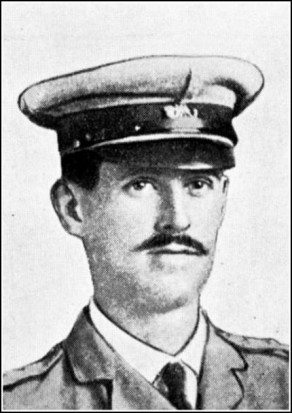
Captain Arthur Morris SLINGSBY
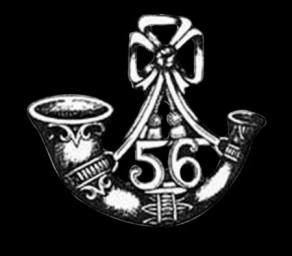
Regiment / Corps / Service Badge: Punjabi Rifles, 56th (Frontier Force)

Divisional Sign / Service Insignia: 7th (Meerut) Indian Division
Data from Soldiers Died in the Great War 1914 - 1919 Records
Soldiers Died Data for Soldier Records
Surname: No entry in SDGW - Indian Forces.
Forename(s):
Born:
Residence:
Enlisted:
Number:
Rank:
Regiment:
Battalion:
Decorations:
Died Date:
Died How:
Theatre of War:
Notes:
Data from Commonwealth War Graves Commission Records
CWGC Data for Soldier Records
Surname: SLINGSBY
Forename(s): Arthur Morris
Country of Service: Indian
Service Number:
Rank: Captain
Regiment: 56th Punjabi Rifles (Frontier Force)
Unit:
Age: 30
Awards: M C
Died Date: 08/03/1916
Additional Information: Son of Mr. and Mrs. J. A. Slingsby, of Carla Beck. Carleton-in-Craven, Skipton, Yorks.
View Additional Text
View Additional Text For Soldier Records
England & Wales, National Probate Calendar (Index of Wills and Administrations), 1858-1966
1916
SLINGSBY Arthur Morris of Carla Beck Carleton-in-Craven Skipton Yorkshire died 8 March 1916 in Mesopotamia killed in action Probate London 25 November to John Arthur Slingsby cotton manufacturer and spinner. Effects £1191 5s. 6d.
1931
SLINGSBY Amelia Frederica of Carleton near Skipton Yorkshire (wife of John Arthur Slingsby) died 14 June 1931 Probate London 22 September to the said John Arthur Slingsby spinner John Slingsby schoolmaster and Edgar Wood solicitor. Effects £151 4s.
1942
SLINGSBY John Arthur of Carla Beck Carleton near Skipton Yorkshire died 28 September 1941 Probate Llandudno 18 March to Philip Brande Slingsby captain H.M. army and Stephen Edwin Brown solicitor. Effects £21929 9s. 12d.
View Additional Image(s)
Additional Photo(s) For Soldier Records
View Craven Herald Articles
View Craven Herald Articles

17 March 1916
SLINGSBY – March 8th, killed in action in Mesopotamia, Captain Arthur Morris Slingsby, second son of Mr. J. A. Slingsby, Carleton-in-Craven, aged 30 years.
17 March 1916
CAPTAIN MORRIS SLINGSBY KILLED IN MESOPOTAMIA
Within nine mouths of this terrible and devastating war, the family of Mr. J. Arthur and Mrs. Slingsby of Carla Beck, Skipton, have suffered irreparable bereavement. On July 11th, 1915, Lieut. A. F. K. Slingsby, attached to the 6th Duke of Wellington’s West Riding Regiment, met his fate while engaged with the
Forces in France; and now, on March 8th, Captain Arthur Morris Slingsby, attached to the 56th Punjabi Rifles, the second son of Mr. and Mrs. Slingsby, fell in action against the enemy in Mesopotamia. Captain Slingsby, a fine specimen of manhood in every sense of the word, was with General Aylmer’s force going to the relief of General Townshend and his beleaguered army in Kut. Letters received from the deceased officer have painted a terrible picture of the conditions under which the relief forces have been fighting their way for some time, and of the havoc wrought amongst officers and men in the performance of a most exacting but necessary duty.
Educated at Aysgarth School, and Wellington College, Sandhurst, Captain Slingsby, who was 30 years of age, chose the Army as his profession, and he passed into the Indian Army in February, 1914. He was a fine athlete and keen sportsman, and whilst at Sandhurst represented his college on the track against Woolwich. During his period of service in India he had an opportunity of indulging in sport, and trophies of his skill have been received at Carla Beck from time to time. He was a noted climber and a member of the Alpine Club, and did much survey work, particularly of virgin peaks in India, under Government orders. He was in India when war broke out, and his first experience of fighting was in Egypt where he took part in the Battle of Ismalia. A typical British officer, he was like his brother who pre-deceased him, beloved by his men, and the news of his death is lamented by all who knew him.
We are too feeble to convey the sympathy of the inhabitants of Craven with the family, who have given four sturdy sons to their King and Country, but this we can say – that while Mr. and Mrs. Slingsby feel deeply the loss of two fine lads, they are proud to know that they have brought honour to the King’s uniform, and leave behind them an example of clean living and high standing, and a memory that will be revered by all whom they were brought into contact.
The three surviving sons are:– Mr. John Slingsby; Lieut. Stephen H. Slingsby, on H.M.S. Defence in the North Sea; and Second-Lieut. P. B. Slingsby, with the A.S.C. in France.
24 March 1916
SKIPTON PETTY SESSIONS – THE LATE CAPTAIN SLINGSBY
Prior to the commencement of the business of the Court, the Chairman said:– “It is only a few months since in this place I expressed on behalf of my colleagues and myself our deep sympathy with a most respected member of the Bench, Sir Arthur Slingsby, in the loss of a gallant son. I am very sorry that today I have to stand here and express our sympathy and sorrow with him, even in a deeper measure if possible, in the loss of a second gallant son. Those who knew Captain Slingsby knew him as a man of great promise, and knew him as a magnificent type of young Englishman, keen, resourceful, and anxious to do his duty, and our sympathies today go out to his parents and the family in the loss they have sustained. I suppose it is almost impossible to measure the misery which has been brought to homes, not only in England but other countries, by this terrible war, and one can only hope that each of these gallant lives brings the desired result – the triumph of the Allies in their good cause – one step nearer. We express our deep sympathy with Mr. and Mrs. Slingsby and family.”
31 March 1916
SKIPTON UNION, BOARD OF GUARDIANS – THE LATE CAPTAIN SLINGSBY
Prior to the commencement of business Mr. Speak, who presided temporarily, briefly moved a resolution of sympathy and condolence with the Chairman (Mr. Slingsby) and his family in the irreparable loss they had sustained by the death of Captain Morris Slingsby, also that it be recorded in the minutes.
Mr. Slater seconded, remarking that when he was requested to do anything of this kind it always reminded him that he had lost a son of his own, consequently he could enter into the feelings of those who had lost theirs.
The Clerk, on behalf of the officials, associated himself with the resolution. He had known the Slingsby boys all their lives and to him it was a matter of very deep regret that the Chairman should have lost a second son.
The resolution was carried, the members rising in their places.
Votes of condolence were also passed with Mr. J. Stockdale (Burnsall), and Mr. W. Demaine (Barden) in the loss they had sustained by the death of their wives. A joint resolution was moved by the Rev. B.J. Harker, seconded by Mr. Hodgson.
Mr. Slingsby thanked the Board on assuming control of the proceedings.
21 April 1916
THE LATE CAPTAIN MORRIS SLINGSBY AWARDED THE MILITARY CROSS
In the ‘London Gazette’ of Friday last appeared the announcement that the Military Cross had been awarded to Captain Arthur Morris Slingsby, 56th Punjabi Rifles, Indian Army, the second son of Mr. J. Arthur Slingsby, J.P., of Carla Beck, Skipton, who was killed in action in Mesopotamia on March 8th, as recorded in our columns a few weeks ago.
The following are extracts from a letter written by the O.C. 56th Rifles, to Mr. Slingsby:–
“You will be thankful to hear that his death was instantaneous. He was shot through the heart while most gallantly leading the final rush of the 58th. This was the third battle in which the 58th had taken part, and on both previous occasions your son had greatly distinguished himself by his magnificent courage. On one occasion, as usual, he had worked his way to the head of the attack and was leading on the men, although as Adjutant his place might well have been further in the rear. Still, the men trusted him and he knew they would follow him.
“The 58th has lost in him another magnificent officer, who always had the best interests of his regiment at heart, and learned to know the regiment in a manner which was quite exceptional. He was absolutely invaluable to me, and relieved me of much work and much anxiety. I could trust him absolutely. In the regiment we cannot talk about it, but we mean to go on sticking to it.”
An extract from a letter from Officer Commanding Depot in India:–
“He had already been mentioned in Dispatches for very gallant conduct and for the able way he commanded the regiment after his seniors had been wounded. This was on the 13th of January…
“The regiment, under the command of your son, held on to a position within a few yards of the enemy from sunset till 12 midnight, and covered the retirement of the rest of the Brigade. His death is a terrible loss to the regiment as he was loved by all the men and they would have followed him anywhere. He had the implicit confidence of the whole regiment.”
Extract from a letter from the Chaplain:–
“He died as one would expect, leading his men, when his regiment was doing a really splendid attack. It is sad that he has gone, when only 24 hours previous he had received the Military Cross. I laid him to rest on the battlefield. May he rest in peace. He was loved by all his regiment, and the regiment has lost a first rate Adjutant.”
12 January 1917
IN MEMORIAM – CAPTAIN ARTHUR MORRIS SLINGSBY
We reprint the following article from the ‘Alpine Journal’ of October 1916, relating to Captain Arthur Morris Slingsby. It is written by J. Norman Collie and T. G. Longstaff, and will be read with interest by the dead officer’s many friends In Craven:–
By the death of Morris Slingsby the Alpine Club has lost one of its members who possessed all the real qualifications of a great mountaineer. He was the son of Mr. J. Arthur Slingsby of Carla Beck, Skipton, who has suffered terribly by the war, having lost two other sons as well as Morris Slingsby, one in France and one in the great battle in the North Sea.
Morris Slingsby was no ordinary climber of mountains; he had won his spurs amongst the greatest, most magnificent, and by far the most difficult of mountain lands, the Himalaya. His rock-craft and ice-craft were perfected in the most strenuous school, where expeditions last not hours but days, and hard work and exposure at high altitude are only preliminaries to the great fight and struggle for the final desperate attempt on the coveted peak.
Climbing in the Himalaya naturally demands more from the climber than any other range of mountains; all is unknown the route is over ground never before trodden by the foot of man. Everything is on a gigantic scale, their magnificence and their dangers; to have fought with these giants as Morris Slingsby did on Kamet could only have been done by one who possessed a physique of steel, a knowledge of climbing technique far beyond the ordinary, and a desire and joy for wandering in wild places of the earth given to very few. And the pity of it is that in the spring-time of his life Morris Slingsby, who promised to be perhaps the finest of Himalayan explorers and climbers, should die before he had accomplished the great things that were waiting for him. If he had been able to climb with Mummery in his prime mighty things would have been done. The magnificent dash of Mummery [Albert Frederick Mummery] and the untiring energy and enthusiasm of Morris Slingsby surely would have surmounted difficulties that would have defeated most other mountaineers. But these things could not be; this disastrous war has ended thousands of lives that would have brought honour and fame to their country and themselves, and the, ‘might-have-beens’ lie scattered like autumn leaves after an October gale.
Morris Slingsby was born in 1885; he was educated at Aysgarth School, Wellington, and Sandhurst, and joined the Indian Army in 1905. He was posted to the 56th Rifles, F.F., 1906. He was promoted Captain and made Adjutant of his regiment in 1914, fought at Ismailia, and in November 1915 went to Mesopotamia. On January 13, 1916, he took temporary command of the regiment, and on that day gained the Military Cross. On March 8, 1916, he was killed in an attempt to relieve General Townshend and his beleaguered army in Kut.
Morris Slingsby began his mountaineering in the orthodox manner and at an early age. Usually one of his companions was his cousin, W. E. Slingsby, now Sub-Lieutenant, R.N.A.S. At first the country round Skipton afforded them scope, Gordale Scar, Malham Cove, Ingleborough and Penyghent, and other wild parts of the Yorkshire moors, where many interesting rock problems were solved. Like many other excellent mountaineers, Morris Slingsby was initiated into the mysteries of snow-craft and the use of the ice-axe and the Alpine rope at Wasdale Head, where he had much climbing in ice and snow. Of course he was chiefly indebted to Cecil Slingsby for most of his early knowledge of mountaineering but he also did a good deal of climbing with other members of the Alpine Club before he went to India.
His first great Himalayan expedition was with Dr. Longstaff, when they discovered, east of K.2 and the mass of giant peaks at head of the Baltoro Glacier, a glacier, the Siachen Glacier, that is probably the largest outside the Arctic regions, and surrounding it numberless new peaks, all over 20,000 feet. A description of this splendid piece of exploration will be found in the ‘Alpine Journal,’ vol. xxv. 38 seq.
In 1911 he decided to try to ascend Kamet, and made several attempts on this mountain. A letter he wrote to Cecil Slingsby, after his first failure on Kamet, is worth, quoting, for it shows in more ways than one the sort of man Morris Slingsby was:–
‘Dear Cousin Cecil – Just a line to tell you I failed to get up Kamet. My friend, who is with me, got very unwell at 17,000 feet and I also was very sick, so we came down to our base camp at 13,000 feet for a couple of days. I afterwards went up myself with one orderly and six coolies. I never felt so fit in my life. We made our first camp at 18,000 feet and then had a pass to get up, a vile place, all ice and rock from 18,000 feet to 20,500 feet. It took us from 5.30 a.m. till 5 p.m. For some five hours I was hewing steps in the ice, at intervals (not continuous), going up above and throwing down the rope and hauling up the coolies, the sepoy abusing them below and shoving them up with his ice-axe. Showers of stone avalanches came down the main gully, but I had taken a side one, and only had to cross the main one once, when it was for me a half-hour of trembling and cursing at the people to hurry up.
‘The coolies had never been so high, and they wept bitter tears, shrieked to their gods to help them, and howled for their fathers and mothers.
‘A thick fog, icy cold, and a panting me cutting steps, encouraging, hauling up by ropes, terrified coolies. Also a howling wind and time flying past towards darkness and still many feet to go: all this at nearly 20,000 feet. At last we got to the top, a corniced ridge, which I dared not put up a tent upon a lovely view over Tibet.
‘When the clouds separated, one place only could we find for a tent, and the stones mere so solidly frozen in that even ice-axes would not budge them. One of the coolie loads perched on a rock, blown by the wind started to roll; we recovered it next evening 1500 feet down the gully of the pass. I was radiant. Success seemed assured. I was as fit as the proverbial fiddle, and even slept a good deal during the night.
‘Rising at 5.30, on to the top and looked at Kamet. A carriage-drive snow walk to the top, no more difficulties. I returned to camp and then came the shock. My orderly, whom I have never known ill before, had fearful headache, &c., and all the coolies were begging me to go down. Had I had some one perfectly trustworthy with me, a guide or a porter, I could have sent him down with them, and with one man to go on with, Kamet were mine, no doubt about it, but then was I justified in keeping so many sick people at such a height merely to satisfy personal ambition? I set out and walked up to about 21,000 feet, determined to leave things to chance, so fit I felt and so vile seemed the idea of failure when success was in my grasp. I had no headache and a feeling that I could go all day, but then I began to think it out, and the knowledge that I was one in eight who was fit crept over me, and I soon saw it would not do even to go on and risk the lives of all those I left behind.
‘At last I reluctantly realised that Kamet was not for me, but for someone who could afford porters and guides from Europe and thus be independent of coollies. Again as I still went on, and though feeling no ill effects, yet found that the soft snow and high altitude made me pant, and I saw that to go alone from 20,500 feet to 25,000 and back in one day was out of the question, and that another camp would be essential, and that I alone unaided could not get any loads up to that other camp. Having taken some photographs, I, quite miserable, with success so near, turned back. I’ll tell you no more. I feel to have lost the chance of a lifetime, and it makes me feel perfectly miserable. Should no one try it next year I will, however, do it in the following year. I feel no doubt in my own mind on the subject, and I am going to save money forthwith and do it with sepoys to carry the loads – oh how wretched failure is with one’s goal so near!’
A description of his second attempt on Kamet, when he barely escaped with his life, is in the ‘Alpine Journal,’ vol. xxvii. p. 326.
And he was as good, a soldier as he was a mountaineer.
The following letter is from Colonel Elsmie, of Morris Slingsby’s regiment, to Morris’s father:–
‘You will have seen before this reaches you the very sad news that your gallant son lost his life on the 8th March. You will, however, be longing to hear further details, and I trust that this letter will not be long delayed en route. You will be thankful to hear that his death was instantaneous. He was shot through the heart, while most gallantly leading the final rush, of the 56th. This was the third battle in which the 56th had taken part and on both the previous occasions your son had greatly distinguished himself by his magnificent courage.
‘On this occasion, as usual, he had worked his way to the head of the attack and was leading on the men, although as Adjutant his place might well have been further in rear. Still the men trusted him and he knew that they would follow him. Our attack did not get home, but this was through no fault of the 56th which must have lost 40 per cent. of the men in the front line before attack was brought to a standstill… The 56th has lost in him another magnificent officer, who always had the best interests of his regiment at heart, and learnt to know the regiment in a manner which was quite exceptional. He was absolutely invaluable to me, and relieved me of much work and much anxiety. I could trust him absolutely. I feel quite lost without him… In the regiment we cannot talk about it, but mean to go on sticking to it.’
‘This disastrous war is answerable for much, but in the destruction that it has brought about there is nothing more sad than the sacrifice of the splendid youth of a large portion of the world. Morris Slingsby represented one of the very finest types. Those who knew him well will never forget him, and he will be remembered first for what he was himself, and afterwards for the great things he had done, in even the short life that was granted to him.’ J. N. C.
The Indian Army and the Alpine Club have suffered a very severe loss in the death in action of Morris Slingsby. Officers of the 56th Rifles from General Michael Tighe downwards, have borne universal testimony to his excellence as a regimental officer. He was beloved by his men. It was a typical action on his part that, when owing to heavy casualties he found himself in command of the regiment and received orders to retire, he walked back under heavy fire to Brigade Headquarters to verify the accuracy of the order, returned under heavy fire to the remnants of his battalion, and led them out of action with a minimum of loss.
As a climber he was one of the toughest and most resolute. As a companion his cheeriness and good temper were unfailing. Most of our success on the Saltoro and Siachen glaciers in 1909 was due to him. He was very disappointed that we did not go for some of the numerous high peaks in the neighbourhood, but he cheerfully gave way to my leanings towards exploration. His extraordinary and thrice repeated attempts on Kamet – had we a full account of them – would form the most exciting story in Himalayan literature. And this was all done with only the aid of his own sepoys and the local Bhotyas. From a short conversation and a few letters I have had from him on the subject I think it is certain that be reached 24,000 feet. He has managed to take natives higher with him than anyone else. To anyone who knows the East this speaks volumes as to his character. Upright, honourable, fearless, he has left behind him a reputation few can equal and none surpass. T.G.L.
04 July 1919
PEACE SUPPLEMENT TO THE 'CRAVEN HERALD' – CRAVEN'S FALLEN OFFICERS
CAPTAIN ARTHUR MORRIS SLINGSBY
56th Punjabi Rifles, second son of Mr. and Mrs. J. A. Slingsby, Carla Beck, Skipton, killed in action in Mesopotamia, March 8th, 1916, A noted climber and member of the Alpine Club. Did much survey work, particularly of virgin peaks in India under Government orders.
View West Yorkshire Pioneer Articles
View West Yorkshire Pioneer Articles

17 March 1916
CAPT. MORRIS SLINGSBY KILLED – Mr. Slingsby’s Second Bereavement
The sad news was received on Monday evening by Mr. and Mrs. J. A. Slingsby of Carleton, that their second son, Captain Arthur Morris Slingsby, attached to the 59th Punjabi Rifles, had fallen in action at Mesopotamia. It was not till Tuesday morning that the news became generally known, and it caused much sorrow amongst the people of Carleton and the surrounding district, where Mr. and Mrs. Slingsby are so well known and highly respected. It will be remembered that it was only on July 15th last that another son, Lieut. A.E.K. Slingsby, of the 6th Duke of Wellington’s Regiment, was killed in France, and this second loss which the family has been called upon to bear will evoke the sympathy of all.
Captain Slingsby was the only member of Mr. J. A. Slingsby’s family to choose the Army as a profession, though on the outbreak of war two others joined, viz., the late Lieut. Anthony Slingsby, and Lieut. P.B. Slingsby, who is with the A.S.C. in France. Of Mr. Slingsby’s two other sons, the eldest is Mr. John Slingsby, and the other, Lieut. Stephen H. Slingsby, is on H.M.S. Defence in the North Sea. Truly it may be said that the Slingsby family have done their duty in the war.
The late Captain Slingsby was a fine specimen of manhood in every sense of the word, being 6ft. 4in. in height. He was with General Aylmer’s force going to the relief of General Townshend and his beleaguered army in Kut. Letters received from the deceased officer have painted a terrible picture of the conditions under which the relief forces have been fighting their way for some time, and of the havoc wrought amongst officers and men in the performance of a most exacting but necessary duty.
Educated at Aysgarth School, and Wellington College, Sandhurst, Captain Slingsby, who was 30 years of age, chose the Army as his profession, and passed into the Indian Army in February, 1904. He was a fine athlete and keen sportsman, and whilst at Sandhurst represented his college on the track against Woolwich. During his period of service in India he had an opportunity of indulging in sport, and trophies of his skill have been received at Carla Beck from time to time. He was a noted climber and a member of the Alpine Club, and did much survey work, particularly of virgin peaks in India, under Government orders. He was in India when war broke out, and his first experience of fighting was in Egypt where he took part in the Battle of Ismalia. A typical British officer, he was, like his brother who pre-deceased him, beloved by his men, and the news of his death is lamented by all who knew him.
Comment on this Soldier Record
You can leave comments on this soldier record. Please note all comments will be manually approved before they appear on the website.

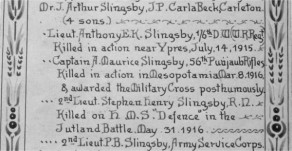
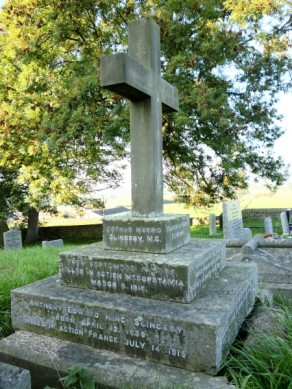
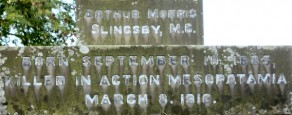



No comments yet.